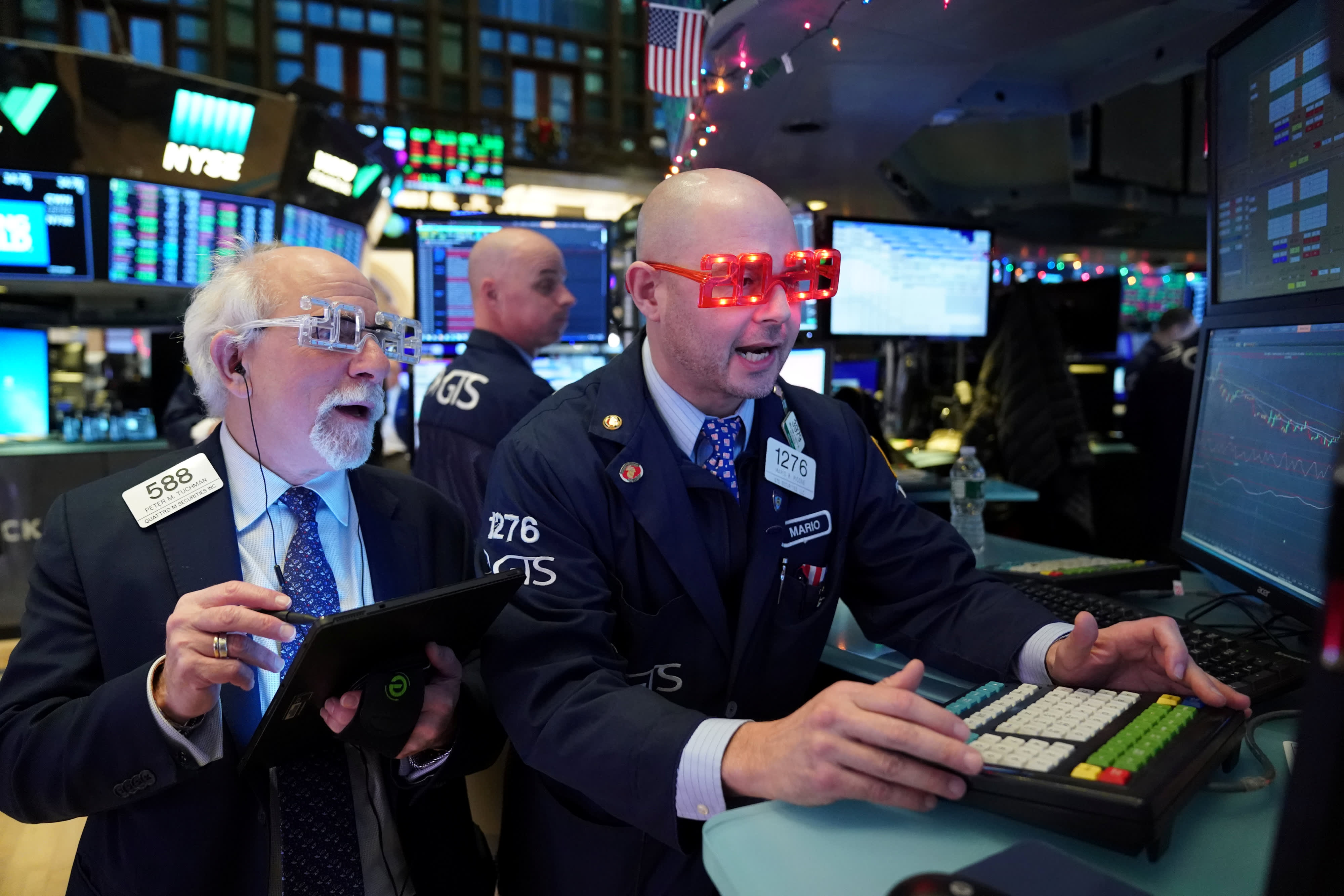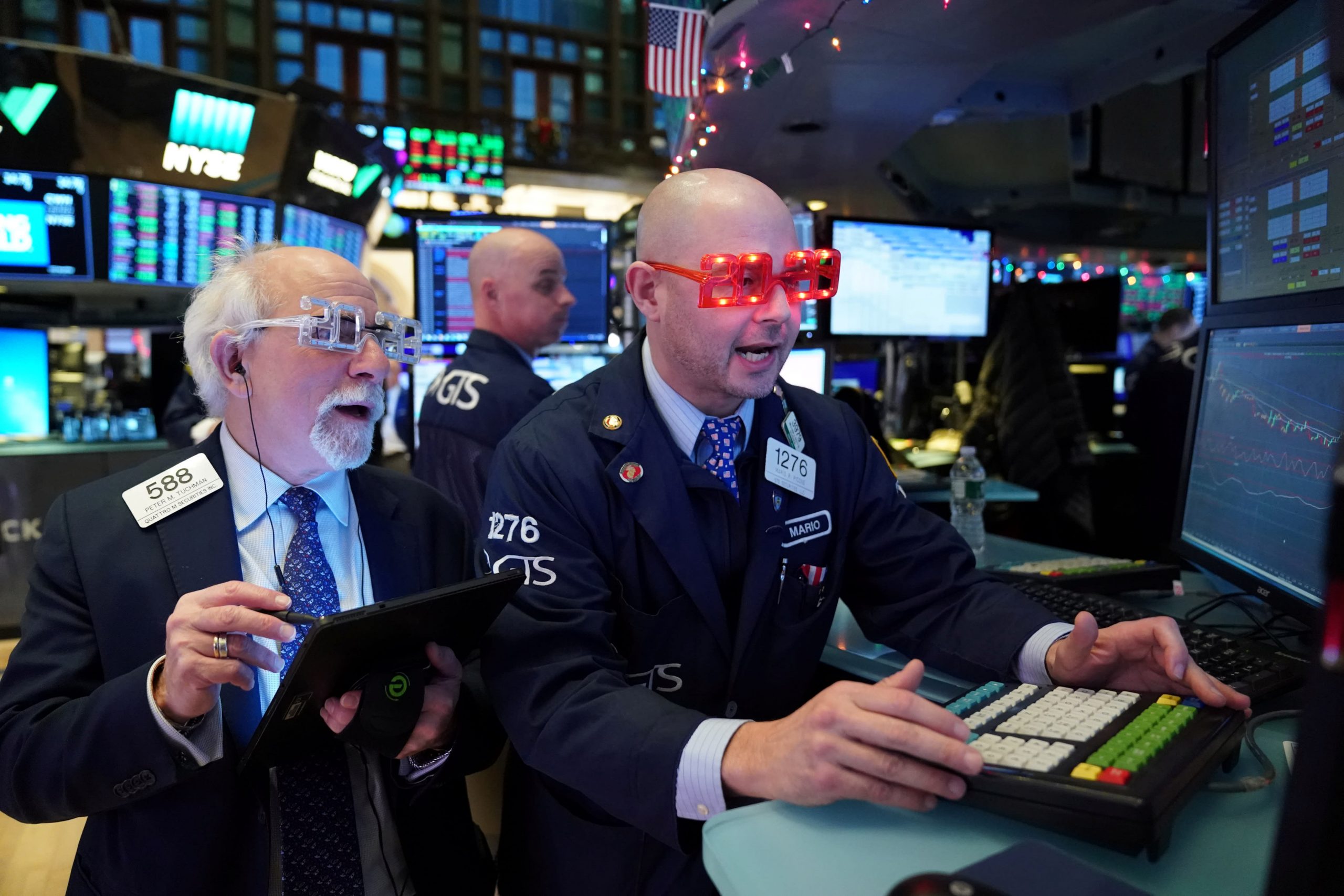
Democratic presidential candidate Sen. Bernie Sanders (D-VT) speaks during a campaign event at NOAH’s Events Venue on December 30, 2019 in West Des Moines, Iowa.
Joe Raedle | Getty Images
J.P. Morgan’s private bank, which manages $2.2 trillion for wealthy clients, said a presidential victory from a radical leftist candidate is among the biggest threats to their money in 2020.
The firm also warned about a possible inflation scare in its annual outlook report to clients.
With left-winged Democratic presidential candidates like Sen. Elizabeth Warren and Sen. Bernie Sanders as front-runners in the national primary polls, J.P. Morgan sees a ban on stock buybacks, increased corporate tax rates, collective bargaining and a break-up of big tech as distinct possibilities.
“A progressive overhaul of the U.S. economy after the election” would be among the biggest perils, wrote Michael Cembalest, chairman of market and investment strategy for J.P. Morgan Asset Management, in the report.
President Donald Trump’s growth strategy fueled by tax cuts and deregulation has lead the stock market to an all-time high, with returns well above the average U.S. president three years into their terms. The S&P 500 had its best run in six years, gaining nearly 30% in 2019. However, Trump was impeached by the House of Representatives in December for abuse of power and obstruction on Congress regarding Trump’s dealings with Ukraine, which could hurt his reputation at the polls, J.P. Morgan noted.
Cembalest told clients a Warren-like progressive overhaul will ultimately be up to U.S. voters and whether “unorthodoxies and misdeeds of the President offset a pretty strong US economy.”
Warren topping FDR taxation
Warren has made headlines and garnered much support from her proposed plans for big taxation to pay for her spending plans on health care and public education. As a “way to illustrate the breadth of the 2020 progressive agenda” J.P. Morgan compared the size of Warren’s plans to President Franklin D. Roosevelt’s tax overall during the Great Depression.
“Warren’s tax increase proposals are roughly 2.5 times the level of FDR’s tax increases that took place during the Great Depression, a time when US unemployment reached 22%,” Cembalest said.
While Warren and Sanders are a legitimate threat, the firm noted that Trump has the strongest election tailwinds since 1896, with regard to market and economic score. The score includes consumer price inflation, unemployment levels, GDP, equity market returns and volatility and home price appreciation.
“Current conditions compare favorably for Trump as an incumbent compared to history,” said Cembalest.
Inflation scare
While J.P. Morgan is expecting a recession-free year with 7% to 10% returns in the equity markets, stocks have to overcome the potential risk of a spike in inflation.
“One 2020 peril is a pickup in US wage or price inflation that indicates that the Fed has made a serious mistake in cutting real rates to zero (again),” Cembalest warned.
Since 2007, the Federal Reserve has undergone a “massive shift” on policy rates, with current estimates of the natural real rate of interest at less than 1%, the firm noted. These consistently low rates pose the risk of a spike in prices.
The Federal Reserve lowered interest rates three times last year, landing the overnight lending rate to a range between 1.5% and 1.75%. Fed Chair Jerome Powell has stressed that any future move to increase borrowing costs would have to be preceded by a meaningful and consistent uptick in inflation. The core PCE index is the Fed’s preferred inflation measure and has consistently undershot the U.S. central bank’s 2% target this year.
Still, J.P. Morgan said a large inflation surprise is unlikely because a “decline in labor bargaining power, the increased speed of retail price readjustments, the impact of globalization on wages” have all contributed to low, stable U.S. inflation.
Recovery in value stocks?
“For value investors, the time to despair may be ending,” Cembalest also told clients in the report.
For the last decade, hot growth stocks have left value stocks in the dust in a big way. However, at the end of 2019, value stocks started to see signs of life relative to growth stocks, although pretty much confined to large cap stocks so far. J.P. Morgan said the possible last days of extreme value underperformance are unfolding, with technicals showing extreme discounts for value stocks.
“The spread between the cheapest and most expensive stocks is at its widest level since 2002, although it is nowhere near the peaks of 1999-2000,” Cembalest said.
IPOs not dead
Another major theme of 2019 was the woes of the IPO. Some highly anticipated technology companies in the IPO, like Uber and Lyft, and pre-IPO, like WeWork, made headlines for their lack of profitability. The public markets spoke and Uber and Lyft ended the year as some of the most disappointing public offerings.
J.P. Morgan told clients initial public offerings are still a good idea in 2020, “as long as what you’re buying is actually a real technology company.”
— CNBC’s Nate Rattner contributed reporting.


 Signal2forex.com - Best Forex robots and signals
Signal2forex.com - Best Forex robots and signals




